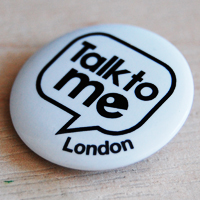It’s been a while, and I haven’t spoken to anyone on the tube since – let me check – mid-December. I’d forgotten how difficult it is to make that initial approach. I tried to talk to a few people yesterday for about an hour, but only really spoke to one person and that wasn’t that interesting. Today though, I set off with some more determination. While I’ve had some time off from doing this I’ve given some thought to how I can do it a bit differently.
As part of this, I’m travelling up and down lines, like I did for the BBC radio thing (coming soon), and picking the best or most interesting encounter. I find that really hard because to be honest I think they’re all interesting in their way, but a bit of editorial control will probably improve the ones I do write up. Therefore sadly I’ll have to leave out the big Jamaican underground worker, the twitchily nervous union rep and the suspicious but curious education professional and get on with it.
I sat down next to a stout gentleman in his thirties wearing jeans and a green coat and immediately started chatting. He responded well and was quick to start asking questions. He told me he had to go do his tax return this afternoon. Oh, what do you do? I asked. “I’m a vicar.” A vicar? Really? And you have to do a tax return? “Yeah, we’re technically self-employed.” Well, you learn something every day, don’t you?
I can’t say I’d ever given much consideration to the employment status of the clergy, I said, finding my eyes flickering to his throat to see if he was wearing a collar (he wasn’t). “You wouldn’t know you’re self-employed because everything comes from this centralized body and you get paid every month.” I had to work hard to supress any jokes about that ‘centralized body’ in fact being God. I’m not religious, so I stayed away from that, but I was still curious about what he did.
What’s it like being a vicar? I asked, rather bluntly. “Um, I love it,” he said, in a somewhat subdued way. “I’m busy and it’s full on. Most people are working in the day so there’s a lot of admin and visiting old and ill people and then in the evening you’re getting people ready for baptisms and weddings.”
I asked what he spent most of his time doing. “Well at the moment quite a lot of fundraising. It’s an old church and needs renovating to the tune of about a million quid.” I whistled. That must be difficult to get hold of at the moment. “Tricky, tricky but not impossible. It’s just a matter of persuading the right people that they want to give it to us. Also a lot of visiting people. I’m fairly new in the post so there’s a lot of that and coming up with the strategy for the next five years or so.”
We talked about London and how we felt about it. “I think a lot of people say they love it…when they’re not in it. It’s a tough city, everyone’s very anonymous.” Would you say it’s a friendly city? I asked. There was a long pause, and I could tell he was trying not to be too negative. “Not really, I wouldn’t,” he admitted. “It can be. It’s unpredictable really. No one talks to you.” We both grinned.
He asked me about where I lived, where I’d been and what my plans were for the future. He was clearly very comfortable in this kind of situation, which I suppose is important for a vicar. This let me get onto my theme for the day, did he have any new years’ resolutions? “Not really, I’m not a very new year person.” He said he felt overwhelmed when trying to think about what he wanted from the year and always ended up with a feeling of “Oh, where do I start?” I never imagined vicars as leading busy or even hectic lives, but it seemed he had the same problems as everyone else in that respect.
No one I spoke to actually had any new years’ resolutions, or at least none they’d admit to. When I pushed the big Jamaican underground worker, asking where he saw himself on 1st January 2013, his answer was simply “rich and not doing this anymore” but in fairness he had just finished a shift and I know that feeling.
The vicar, talking about his plans for the future of his parish, did say that he had a vision for what he wanted “the whole thing” to be in four years or so. “The building to be restored and for it to be used seven days a week, not just for church things. When it was built it was the focal point of the community and it’s lost that, although geographically it still is.”
“There’s a lot of wealth in the area, some houses worth around 20-30 million but there’s quite a big social housing contingent. There’s not very much in the middle.” Earlier, I’d asked him what he meant by strategy and, as well as building use, he’d mentioned outreach. Do you see part of your role as being a bridge between those two sections of the community? I wondered. “Yeah I think to at least engage with them, and try and get them to engage with each other, but it’s quite a big ask really.”
We had reached his stop and he got up, shook my hand and then asked my name and told me his. I realised that through all this time I’ve been talking to people and all the things they’ve told me, I’ve never once found out one of their names before.



Really enjoy your writing, keep the conversations flowing!
24 January, 2012 at 4:26 pm